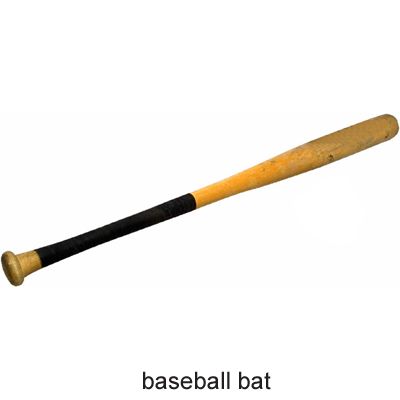From Longman Dictionary of Contemporary Englishbatbat1 /bæt/ ●●● S3 noun [countable] 1 HBAa small animal like a mouse with wings that flies around at night → fruit bat2  a) DSa long wooden stick with a special shape that is used in some sports and games a baseball bat a cricket bat b) British English a round flat piece of wood with a handle, used to hit a ball in table tennis SYN paddle American English3 → be at bat4 → do something off your own bat5 → do something right off the bat6 → like a bat out of hell7 → old bat → as blind as a bat at blind1
a) DSa long wooden stick with a special shape that is used in some sports and games a baseball bat a cricket bat b) British English a round flat piece of wood with a handle, used to hit a ball in table tennis SYN paddle American English3 → be at bat4 → do something off your own bat5 → do something right off the bat6 → like a bat out of hell7 → old bat → as blind as a bat at blind1
 a) DSa long wooden stick with a special shape that is used in some sports and games a baseball bat a cricket bat b) British English a round flat piece of wood with a handle, used to hit a ball in table tennis SYN paddle American English3 → be at bat4 → do something off your own bat5 → do something right off the bat6 → like a bat out of hell7 → old bat → as blind as a bat at blind1
a) DSa long wooden stick with a special shape that is used in some sports and games a baseball bat a cricket bat b) British English a round flat piece of wood with a handle, used to hit a ball in table tennis SYN paddle American English3 → be at bat4 → do something off your own bat5 → do something right off the bat6 → like a bat out of hell7 → old bat → as blind as a bat at blind1Examples from the Corpus
bat• The tunnel is a place only a bat could love.• The murder is perfectly executed, except that the baseball bat left at the scene of the crime is sticky with fingerprints.• Noctuid moths are eaten by bats, and have evolved a special pair of ears to warn them of approaching danger.• Our classmates tested five bats from K. C. Slammer.• Upon being blocked off from the courtyard, the bat would soon have led him to freedom.• This is tested by gagging the bats before releasing them.• Felt queasy after, but swung the bat okay and then came back to the hotel, which is small but clean.batbat2 verb (batted, batting) 1 [intransitive, transitive]DSCDSB to hit the ball with a bat in cricket or baseball2 → not bat an eye/eyelid3 → bat your eyes/eyelashes4 → go to bat for somebody5 → be batting a thousand → bat something ↔ around→ See Verb tableExamples from the Corpus
bat• He batted 205 minutes in the second innings, making 65 not out.• I noticed that she blinked a lot and, at times, seemed to be trying to bat away the dust.• In a tight match at Christleton visitors Oakmere batted first and set a total of 165 for five, Paul Matthews 66.• Laxman batted for 12 hours in two innings over three days here, and naturally was man of the match.• After the hearing you return to the gallery to bat out a quick story.Origin bat1 1. (1500-1600) back “bat” ((14-16 centuries)), probably from a Scandinavian language. 2. Old English batt bat2 1. (1400-1500) → BAT122. (1800-1900) Probably from bate “to beat the wings” ((13-20 centuries)), from Old French batre “to hit” 
